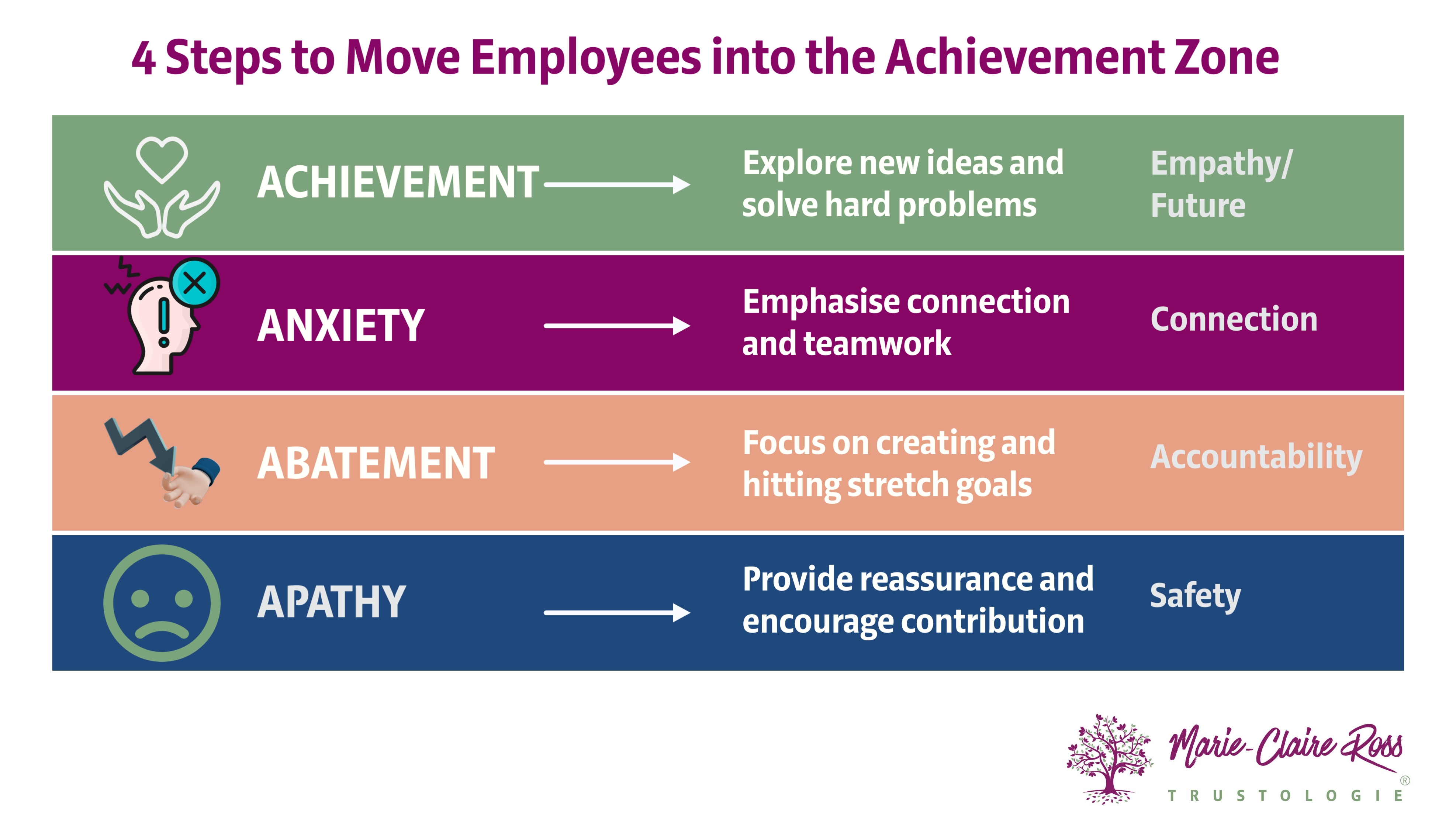11 min read
4 Practical Strategies for Better Emotional Management in the Workplace
I have a friend who often finds herself at the mercy of her emotions. Recently, she called me to rehash a confrontation she’d had with a group of...
Develop leaders, strengthen executive teams and gain deep insights with assessments designed to accelerate trust and performance.

Transform how your leaders think and perform with keynotes that spark connection, trust and high-performance cultures.

Explore practical tools, thought-leadership and resources to help you build trusted, high-performing teams.

Trustologie® is a leadership development consultancy founded by Marie-Claire Ross, specialising in helping executives and managers build high-trust, high-performing teams.

8 min read
Marie-Claire Ross : Updated on January 26, 2026

Table of Contents
2. Avoid recruiting them in the first place
4. Don't reveal your weaknesses or secrets
5. Get your dealings with them in writing
6. Never, ever expect them to support you (emotionally or with work)
8. Don't believe them when they say they will do / be better
9. Don't let them know you know what they are
10. Watch you patterns or triggers
One of the lowest points in my life was when my market research career ended abruptly because of sociopaths who destroyed my reputation. I've never shared this publicly because I have been too ashamed to talk about it.
Unfortunately, it wasn't one sociopath from one company. It was a couple of them in different companies that I worked at.
If your career is tarnished from a couple of sociopaths in one organisation, you can usually move to another company and rebuild your career. Sadly for me, I kept choosing companies led by sociopaths. It resulted in my having to leave market research altogether (it's a small industry).
This happened a long time ago (in the year 2000). There was a silver lining. It gave me the opportunity to work for myself, successfully build two businesses and write two books. It also meant I have spent a lot of time working on myself and facing my demons.
At the time, it was totally devastating. I spent weeks crying all day. The grief and shame of losing my dream job was enormous. I ended up working a menial job with little pressure until I started feeling better. Looking back, it was clear I was depressed, but unable to afford a psychologist I just limped on with life. Luckily, I was newly married with a supportive husband and we just retreated from the world together. Starting a joint business seemed the best way to protect ourselves from bad bosses and people.
Of course, hiding from your problems isn't the answer. There comes a time when the universe brings you an even greater challenge to deal with, so you can face the sociopath outside and the one inside sabotaging your dreams.
I know my experience isn't unusual. In my final market research job (the most dysfunctional of all), I was one of five other young women that I now know received the same treatment. None of them are in market research to this day.
I don't want anyone to go through what I did. It is one of driving forces behind why I champion trusted leaders in organisations.
To reduce the negative impact sociopaths can do to your career or workplace, I've put together a list of things to do (based on my hard won experience).
A lot of people go into shock when they have been mistreated by a sociopath. I commonly hear "I can't believe they did that to me" or "I can't believe they would treat people like that."
Unfortunately, believing that everyone is 'nice' can actually put you at risk of workplace sociopaths either hurting you or using you to get revenge on someone else. Familiarise yourself with the 11 Warning Signs you are dealing with a workplace sociopath to know how they behave. Share it with your leadership team.
Easy to say, hard to do. Sociopaths are masterful at conveying an image of being highly accomplished.
Make sure you have multiple rounds of interviews with lots of people in your organisation. Ensure all of you know the signs of a sociopath and compare notes of your conversations. Also, while you can ring their referees, know these are people who won't tell you the truth (or even believe it). Find other people in the organisation they have worked at who can give you the real low-down on their personality. They often leave a trail of destruction, so finding people who can tell you how they really are, can be quite easy with enough digging (LinkedIn is great for that).
If you have let them into the building, have strong ground rules on what behaviours you will accept. This would be the most important and what I never did well.
Sociopaths, narcissists and psychopaths do not respect personal boundaries. They will call/email you at inappropriate times and expect you to be there when they need you. Interestingly, they think it's totally fine to speak to you for hours about their problems totally ignoring your need for food or sleep. They also tend to misbehave in certain environments.
As an example, I've tentatively renewed a relationship with a toxic sociopath in my family. The boundaries I have put in place are that I will not invite them to any parties/events at my house (that's when they play up - when they have an audience). My rule is only attending events where they will be in public places (where they are less likely to influence an audience).
In a workplace, you want to be clear as to what boundaries are important for you. That might be not having to be left alone with them (where they have the opportunity to undermine or threaten you without witnesses), refusing to accept phone calls after hours, not tolerating late or poor quality work, or allowing them to yell abuse at you or others.
Seems obvious, but if you are quite empathetic it will be natural for you to admit mistakes. Of course, being vulnerable is often promoted as key to being a great leader these days. I will admit that is true, but not if you are dealing with sociopaths. They will throw back your heartfelt secrets in a way that will make your jaw drop. They will also respect you less. Also, make sure you don't admit your secrets or promotion desires to their friends, as they will leak them to the sociopath.
If you need them to do work by a certain date, make sure you have an email trail of what you have asked them to do and when. Avoid making verbal agreements with them, as you will have no proof when things go awry. Make sure that your expectations for their work quality and KPIs are also in writing (preferably visible for all to see).
If they start playing up in your organisation (eg: sick a lot, missing deadlines, abusing staff), make sure any agreements around annual leave or sick leave are also in writing. It's all about putting boundaries and clear communication around your expectations and their accountabilities. Any wriggle room and they will use that to their advantage (including using in court cases).
Sociopaths are not the sort of people that you turn to when you have any people or work challenges. They are not a shoulder to cry on and don't have the emotional maturity to even console you. They are also not very reliable to ask for help. Any sort of help you ask of them will be expected to be repaid or used as a future bargaining chip.
This is central to trust. Sociopaths are not someone you can rely on or trust to do the right thing or make good on their promises. Don't rely on them to do the work required for a high stakes project. Don't rely on them to do work for you if it will improve you reputation (and do little for their own). Don't entrust them with looking after animals, children (even female sociopaths) or people's wellbeing.
This is one of the signs that you are dealing with a sociopath when they just don't improve their behaviours. They really don't think there is anything to improve.
Warning signs started blaring for me when a CEO I was working with told me in an exasperated tone that he had been working with "two psychologists and a coach to improve his accountability and it's really tiring and annoying." Remember, they are un-coachable.
The truth is it won't make them change (they often won't believe it anyway) and it won't help improve the situation by telling them. Worst case is that it makes you a target. Instead, use the information to your advantage. I find flattery always helps improve the relationship with them.
One of the reasons why sociopathic interference ended my career was that I grew up in a family of narcissists (it is hereditary). I wasn't even aware that emotional abuse didn't have to be my daily experience either at work, home or with friends.
If you keep repeatedly getting into situations where there are sociopaths hurting you, it is time to address any past childhood emotional abuse you might have experienced.
In the fantastic book, The Drama of the Gifted Child, by Alice Miller she wrote that if you were raised by narcissists you will subconsciously seek out those with sociopathic energy, so you can recreate the circumstances of our childhood to heal from it.
If you have a lot of negative self-beliefs, you will also be prey for sociopaths. Don't fool yourself that you will be able to handle a narcissist if any of these are true for you. In fact, it will be more detrimental to your mental health than the average person.
Sociopaths thrive in workplaces where there is a lack of accountability, people can't be fired for poor performance, toxic behaviours are ignored and communication is sporadic.
Trusted leaders are visible and demand visibility from their people. Visibility requires shining light in lots of different directions. Nothing is hidden. Be the leader who models how honest, caring leadership is done. My book Trusted to Thrive is the antidote for sociopathic behaviours.
If you have a boss that you believe is a narcissist, seek a transfer. When I was in my twenties I actually realised my boss was working against me (back then I didn't understand the term narcissist) and I asked the CEO in a non-emotional way to provide me with another boss. I had enough evidence for the female CEO to realise I wasn't being supported by my other female boss. Making sure you document your dealings with them is key to this. If you can't remove them as your boss, then it is seriously time to look for another job. It's not worth the damage, it can do to your mental health or career.
On the other hand, if you are a leader who can release sociopaths to another job or organisation, do it quickly. I often find a lot of CEOs or executives will take their time removing them (for fear of backlash) only to receive a barrage of thanks from employees who have been living through daily torture for what can be years. They will then commonly tell me "I wish I had done it sooner. Removing them has almost instantly improved the culture."
As despicable as sociopaths can be, they are still human. The majority of them have been neglected, abandoned or abused as children. They are still hurting.
Unfortunately, they haven't yet dealt with their trauma nor do they see any need to address it. Their lack of connectedness to humans means they truly don’t understand emotions or feelings.
Human emotion is regarded as something they can use to manipulate. They do not understand why a person feels hurt or upset. It means they lack a whole dimension of life that normal people experience. An important dimension that in reality makes us human. They never get to truly love or feel loved by another human being. In truth, I have learnt to feel sorry for them because they are not living a rich, meaningful human existence.
Today, people are leaving jobs that are toxic. A recent study found that a toxic culture is 10.4 times more powerful than compensation in predicting a company's attrition rate compared with its industry. It is believed to be the number one contributor to The Great Resignation.
Toxic workplaces always have sociopaths creating havoc - either at the helm, in the leadership team or operating at mid level. It's a hidden problem because leaders ignore it. Sadly, the damage it does is deep and it can take years to turnaround the toxic, poor performing organisational culture they create. The reality is that the emotional pain employees experience is far more insidious than physical pain.
If you want to minimise the damage caused by sociopaths, use these tips to disempower sociopaths from manipulating you and your workplace.
It is time to create workplaces where people work together is service of a shared goal - a high achievement environment where people wake up in the morning excited about going to work and hanging out with others equally excited by the opportunity to learn, experiment and solve complex problems together. This can only occur in workplaces where sociopaths aren't hidden and protected. Now is the time.

11 min read
I have a friend who often finds herself at the mercy of her emotions. Recently, she called me to rehash a confrontation she’d had with a group of...

9 min read
True leadership presence isn’t a performance or a set of charisma hacks; it is the felt experience of who you are being in the room. By cultivating...

13 min read
As teams return from their summer (or winter) break, you may notice subtle shifts in your team’s energy. Even if the end of year was positive, a new...

One of the issues I always consider when CEOs come to me about improving trust in their leadership team is whether they have a sociopath in their...

Humans are designed to avoid conflict.Employees fear speaking up about issues in case it makes them look stupid or unpopular.Having the courage to...

Have you ever heard about the surprisingly positive influence teachers have on students when they hold high expectations for their academic abilities?